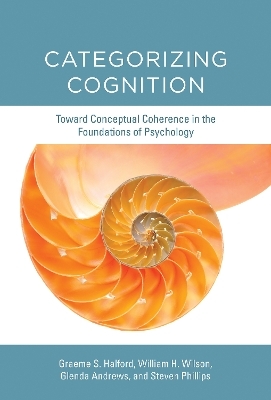
Categorizing Cognition
Toward Conceptual Coherence in the Foundations of Psychology
Seiten
2014
MIT Press (Verlag)
978-0-262-02807-3 (ISBN)
MIT Press (Verlag)
978-0-262-02807-3 (ISBN)
- Keine Verlagsinformationen verfügbar
- Artikel merken
A proposal for a categorization of cognition based on core properties of the constituent processes that integrates theory and empirical findings across domains.
All sciences need ways to classify the phenomena they investigate; chemistry has the periodic table and biology a taxonomic system for classifying life forms. These classification schemes depend on conceptual coherence, demonstrated correspondences across paradigms. This conceptual coherence has proved elusive in psychology, although recent advances have brought the field to the point at which it is possible to define the type of classificatory system needed. This book proposes a categorization of cognition based on core properties of constituent processes, recognizing correspondences between cognitive processes with similar underlying structure but different surface properties. These correspondences are verified mathematically and shown not to be merely coincidental.
The proposed formulation leads to general principles that transcend domains and paradigms and facilitate the interpretation of empirical findings. It covers human and nonhuman cognition and human cognition in all age ranges. Just as the periodic table classifies elements and not compounds, this system classifies relatively basic versions of cognitive tasks but allows for complexity. The book shows that a more integrated, coherent account of cognition would have many benefits. It would reduce the conceptual fragmentation of psychology; offer defined criteria by which to categorize new empirical results; and lead to fruitful hypotheses for the acquisition of higher cognition.
All sciences need ways to classify the phenomena they investigate; chemistry has the periodic table and biology a taxonomic system for classifying life forms. These classification schemes depend on conceptual coherence, demonstrated correspondences across paradigms. This conceptual coherence has proved elusive in psychology, although recent advances have brought the field to the point at which it is possible to define the type of classificatory system needed. This book proposes a categorization of cognition based on core properties of constituent processes, recognizing correspondences between cognitive processes with similar underlying structure but different surface properties. These correspondences are verified mathematically and shown not to be merely coincidental.
The proposed formulation leads to general principles that transcend domains and paradigms and facilitate the interpretation of empirical findings. It covers human and nonhuman cognition and human cognition in all age ranges. Just as the periodic table classifies elements and not compounds, this system classifies relatively basic versions of cognitive tasks but allows for complexity. The book shows that a more integrated, coherent account of cognition would have many benefits. It would reduce the conceptual fragmentation of psychology; offer defined criteria by which to categorize new empirical results; and lead to fruitful hypotheses for the acquisition of higher cognition.
Graeme Halford is Emeritus Professor in the School of Psychology at the University of Queensland, and Adjunct Professor of Psychology at Griffith University. William Wilson is Associate Professor in the School of Computer Science and Engineering at the University of New South Wales. Glenda Andrews is Senior Lecturer in Psychology at Griffith University, Queensland. Steven Phillips is Chief Scientist at the National Institute of Advanced Industrial Science and Technology, Japan.
| Reihe/Serie | Categorizing Cognition |
|---|---|
| Zusatzinfo | 2 color illus., 44 b&w illus. |
| Verlagsort | Cambridge, Mass. |
| Sprache | englisch |
| Maße | 152 x 229 mm |
| Themenwelt | Geisteswissenschaften ► Psychologie ► Allgemeine Psychologie |
| Geisteswissenschaften ► Psychologie ► Biopsychologie / Neurowissenschaften | |
| Geisteswissenschaften ► Psychologie ► Sucht / Drogen | |
| Geisteswissenschaften ► Psychologie ► Verhaltenstherapie | |
| ISBN-10 | 0-262-02807-7 / 0262028077 |
| ISBN-13 | 978-0-262-02807-3 / 9780262028073 |
| Zustand | Neuware |
| Informationen gemäß Produktsicherheitsverordnung (GPSR) | |
| Haben Sie eine Frage zum Produkt? |
Mehr entdecken
aus dem Bereich
aus dem Bereich
Techniken der Verhaltenstherapie
Buch (2024)
Julius Beltz GmbH & Co. KG (Verlag)
35,00 €


